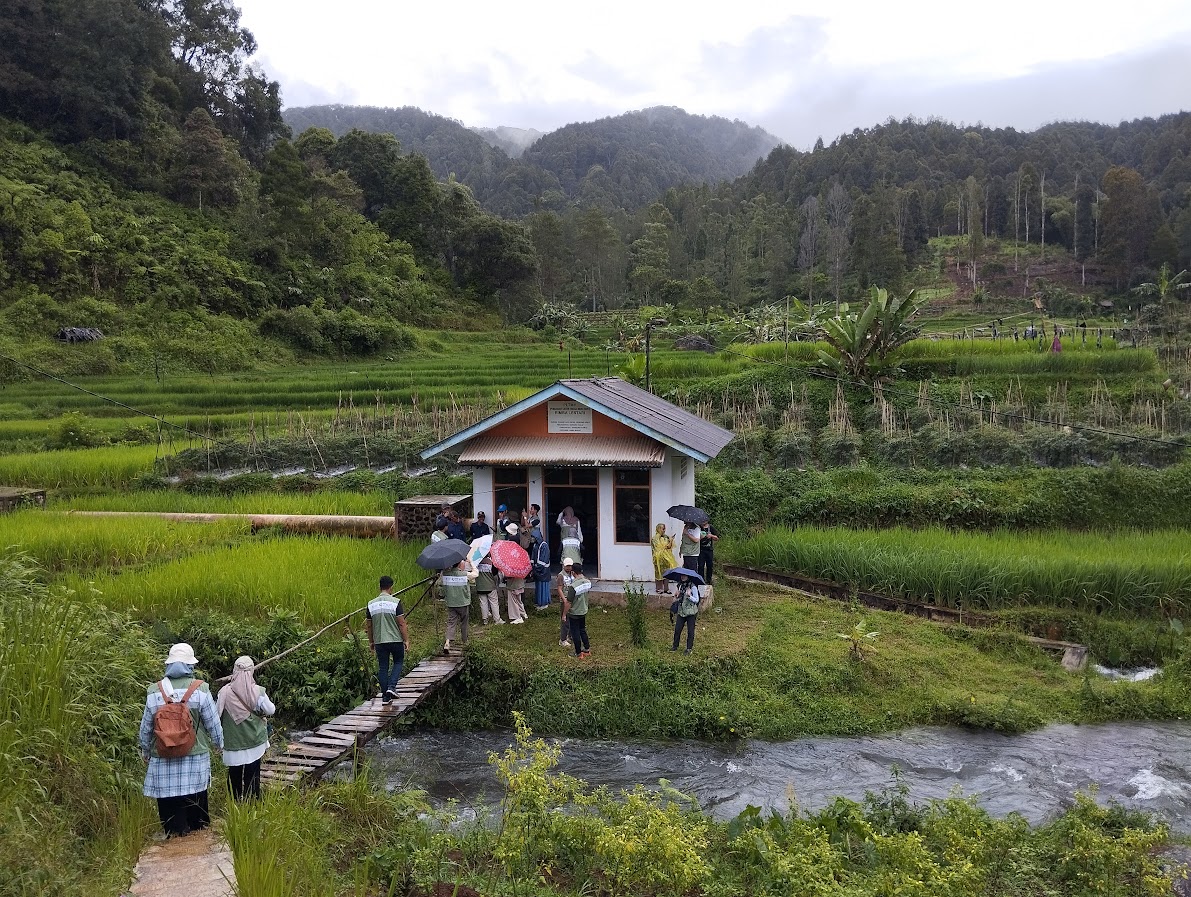Bandung, January 24, 2024 – A relaxed atmosphere and raindrops soaking the ground welcomed the Jelajah Energi West Java team when they arrived at the Gunung Halu Microhydro Power Plant (PLTMH). The winding journey, which took about 3-4 hours from Purwakarta, brought the team to a location that embodies innovation and empowerment of the local community. Gunung Halu Microhydro Power Plant (MHP) is one of the micro-hydro energy empowerments managed by the local community. By utilizing the abundant potential of river water, this micro hydro power plant can generate electricity sustainably without producing high carbon emissions.
The operator of Gunung Halu MHP, Toto Sutanto, explained that before installing the micro hydro, Tangsi Jaya Hamlet’s residents needed more access to electricity and basic amenities like lighting, refrigerators, rice cookers, and televisions. The hamlet relied on oil lamps to illuminate their homes. The lack of infrastructure, distance, and a small population were some of the reasons that prevented the electricity network from entering the hamlet before 2000.
“The residents in the area took the initiative to use the current of the Ciputri River to generate electricity using a simple water wheel for ten years due to certain conditions. Later, the West Java Provincial Energy and Mineral Resources (ESDM) Office recognized and assisted the micro hydro power plant potential. As a result, the residents can now enjoy clean and affordable electricity,” explained Toto.
Toto emphasized that this micro hydro has helped the village become more self-sufficient by adopting renewable energy and providing lighting and electricity that support the daily lives of its residents. The management of the micro hydro plant is now in the hands of cooperative residents. Following the micro hydro installation in Tangsi Jaya Hamlet, the electricity network of PLN entered the hamlet. However, most residents still prefer to use electricity from the micro hydro.
“Around 80 out of nearly 100 households in Tangsi Jaya Hamlet prefer using electricity from micro-hydro as it is more affordable and reliable. The remaining households use electricity from PLN or a combination of both. Micro-hydro electricity costs approximately Rp25,000 per month, compared to PLN’s electricity fee, which can reach up to Rp50,000 per month. However, public facilities are not charged for utilizing electricity from micro-hydro, nor are the elderly,” said Toto.
According to Toto, the micro-hydro power plant installed in the area provides electricity and promotes the preservation of the surrounding nature. The power plant requires a steady flow of water from the Ciputri River. As a result, the residents are discouraged from clearing the forest around the hamlet since doing so would affect the river’s flow and power generation. Therefore, preserving the forest plays a crucial role in maintaining the steady flow of water, which powers the micro-hydro.
“Gunung Halu Micro Hydro plans to expand its operations by adding a more widely utilized unit. The new micro hydro unit is scheduled to be constructed in February 2024, and it will be able to produce 30 kilowatts of electricity. With a significant increase in capacity, the electricity generated from the new micro hydro unit will be fully allocated to meet the residents’ electricity needs,” explained Toto.
Toto mentioned that the existing micro hydro would be shifted to supply power for the coffee processing industry run by residents. Tangsi Jaya’s success in achieving energy self-sufficiency utilizing energy sources from micro-hydro has made the hamlet a pilot for MHP development. To ensure the longevity of the micro hydro, Toto has entrusted the responsibility of maintaining it to the young locals. They must collect fees and guarantee smooth water flow by removing obstacles.
Harvesting Coffee from Renewable Energy
The Tangsi Jaya Hamlet relies on microhydro to power their daily activities and coffee production. When the Jelajah Energi West Java team visited the coffee processing center, they were greeted by the irresistible aroma of coffee. Toto explained that Gunung Halu coffee had two types: arabica and robusta. They are processed using light roast, medium roast, and dark roast methods and several variants such as natural, honey, full wash, and wine.
“The micro hydro system supplies electricity to the coffee factory for processing. The factory uses only 12 kWh of electricity when all machines are running. If the electricity supply is insufficient due to the machines being used, we prioritize the factory’s electricity needs over the residents. However, so far, we have never had to cut off electricity supply to the residents,” added Toto.
Toto said that the coffee processing center was initiated with the support of Darma Persada University (Unsada) through the energy and economic independent village program. The excess power of 3 kW was utilized to promote the use of renewable energy in the financial sector. In 2017, the coffee management center received a donation worth Rp1.98 billion from Japan to implement a circular economy that can contribute positively to social, economic, and environmental aspects of life.
“Currently, coffee processing continues, and the cooperative always encourages empowering the surrounding community. For example, we offer women employment opportunities during harvest and strive to pay a premium price for the coffee we purchase from the farmers. This approach is intended to encourage them to take better care of their plants and the surrounding forests,” said Toto.

